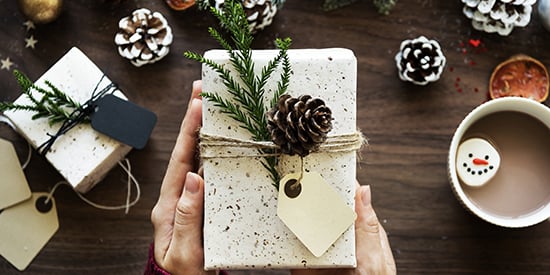Dreaming of a green Christmas? Deakin academics show you how
Media releaseChristmas is the time for giving, which often means the time for waste, so this year Deakin University sustainability researchers have put together a green guide for the silly season.
Start with what's on your plate
Dr Euan Ritchie, Ecologist
"In some respects Christmas has become synonymous with one of society's greatest challenges, our greed and insatiable consumption, and the damage such tremendous demand for resources inflicts on the environment.
"But we all have the power to make positive changes. Nothing says I love my friends and family, and the planet, more than the gift of going green at Christmas time.
"The holiday season often means a special meal with loved ones. This year, if you’re aiming for an eco-conscious celebration, why not try to move away from meat as the main focus of the meal?
"Eating less meat, especially red meat, is a simple and effective way to reduce our carbon footprint. Meat production requires significant amounts of agricultural land and finite resources, like water, especially pertinent in Australia, and livestock produce substantial greenhouse gas emissions.
"If you really like red meat, you could try kangaroo, it's lean and tasty, has much less impact on the environment, and is perfect for searing in summer salads or chucking on the festive barbecue.
"Seafood can be a good choice but buyer beware, many marine species are overharvested, and intense aquaculture can cause other environmental issues. So if you’re looking for greener options, calamari or smaller fish species are generally a better choice, and try to avoid deep sea and long-lived species."
Give the gift of green
Dr Trevor Thornton, Waste management expert
"There's nothing quite like the joy of unwrapping presents at Christmas time, but if you’re looking to make your gift giving a little more environmentally friendly this year, start with what you wrap it in.
"Gift wrap can have a big environmental impact due to three touchpoints - the harvesting of the trees, processing of wood fibre into pulp, and disposal of the product.
"So instead try redecorating scrap office paper, reusing newspaper or refashioning paper bags. Wrapping presents in a child's artwork could also offer a nice personal touch. Or try using other reusable materials such as towels, t-shirts or scarves.
"Instead of cards, send a Christmas photo instead, they're much less likely to be thrown away. At the very least, try to avoid cards with flashing lights and songs, they might look are great but they can cause huge environmental problems once thrown out.
"When it comes to the present, aim for something with minimal packaging, and if a toy needs batteries, think about including rechargeable batteries and a charger.
"Gifting something homemade, organising an experience, buying ethical presents or donating to a charity on behalf of the person you are buying for are also a great options.
"Re-gifting is great for the environment too. You can always say you're saving the planet if you pass on the bath bomb you received in the office Kris Kringle to great aunt Beryl at family Christmas."
Take time out to de-stress
Dr Claire Henderson-Wilson and Sonia Nuttman, Health, Nature and Sustainability Research Group
"In the flurry of the Christmas season our health (including our waistlines) and eco-consciousness often fall by the wayside.
"Stress accumulates as we try to squeeze in family celebrations, Christmas shopping and juggling the kids in the lead into the school holidays.
"When shopping in crowded, over-stimulated shopping malls gets too much, try to take a break in the outdoors.
"Research shows that spending time in nature, whether that includes taking a walk at your local park, beach or reserve, or simply sitting and enjoying a natural view, leaves you feeling less stressed, mentally rejuvenated and more socially connected.
"Promotion of mental, spiritual, physical and social health via contact with nature is important at any time of the year but certainly at Christmas time, it can create the much-sought sense of joy and peace."
Share this story

